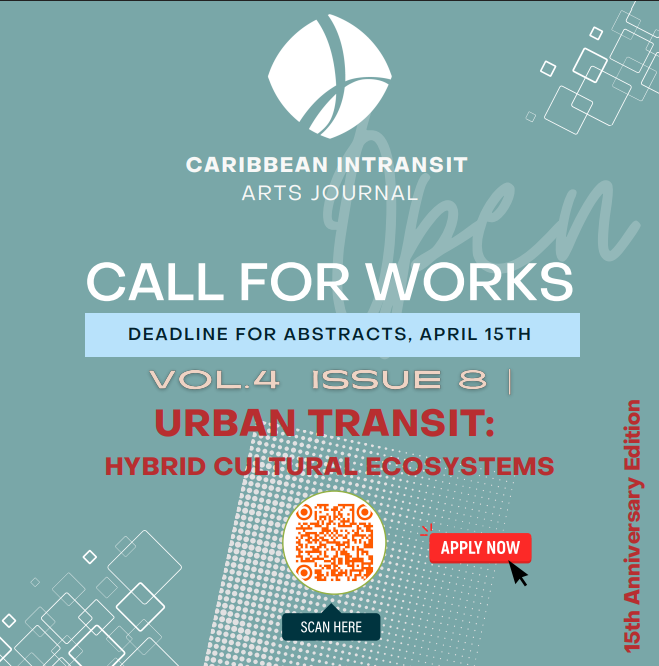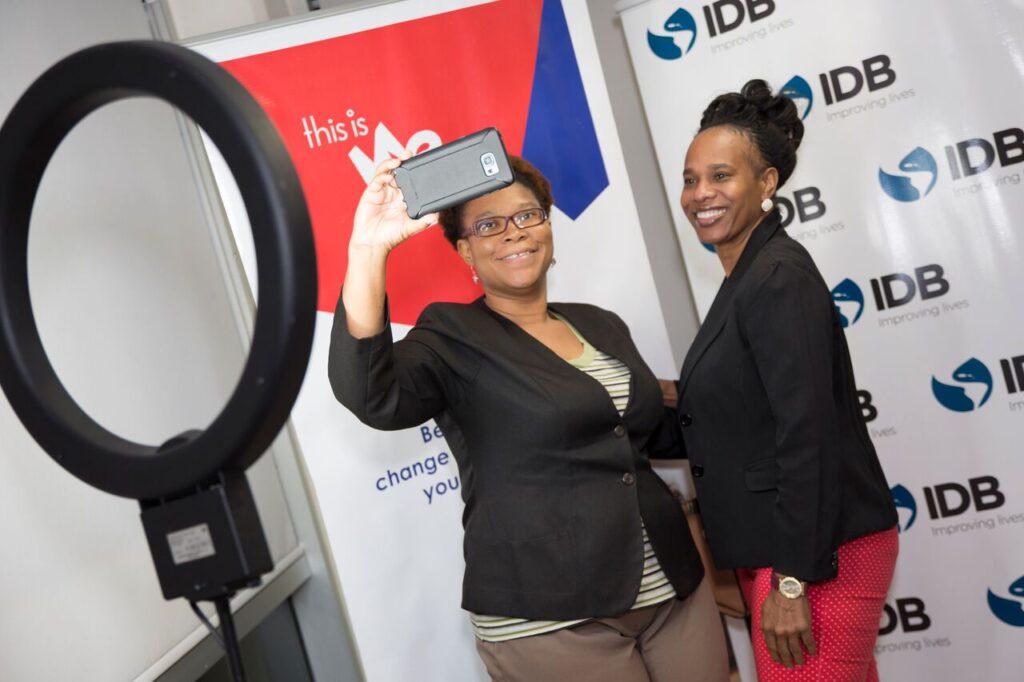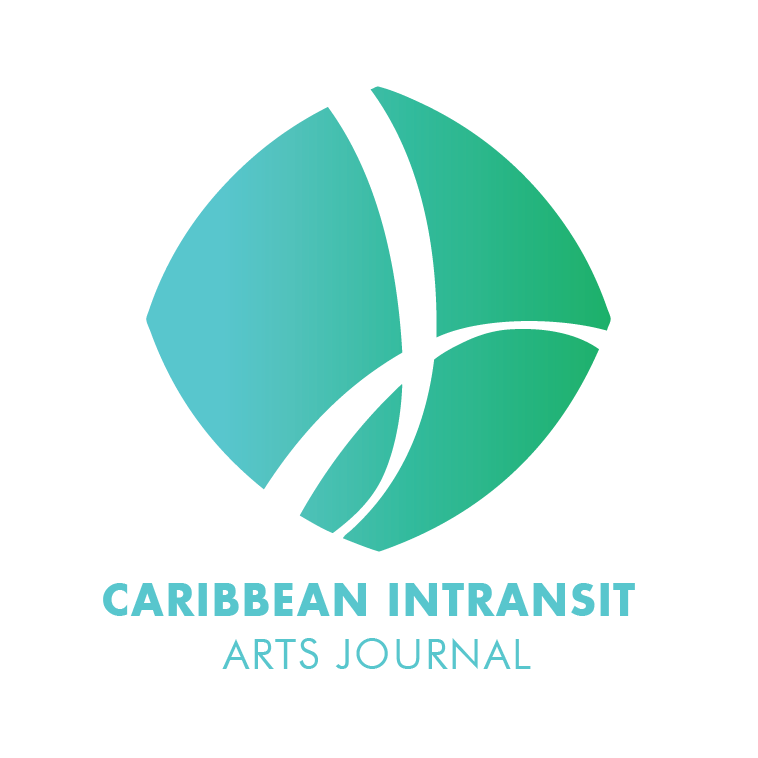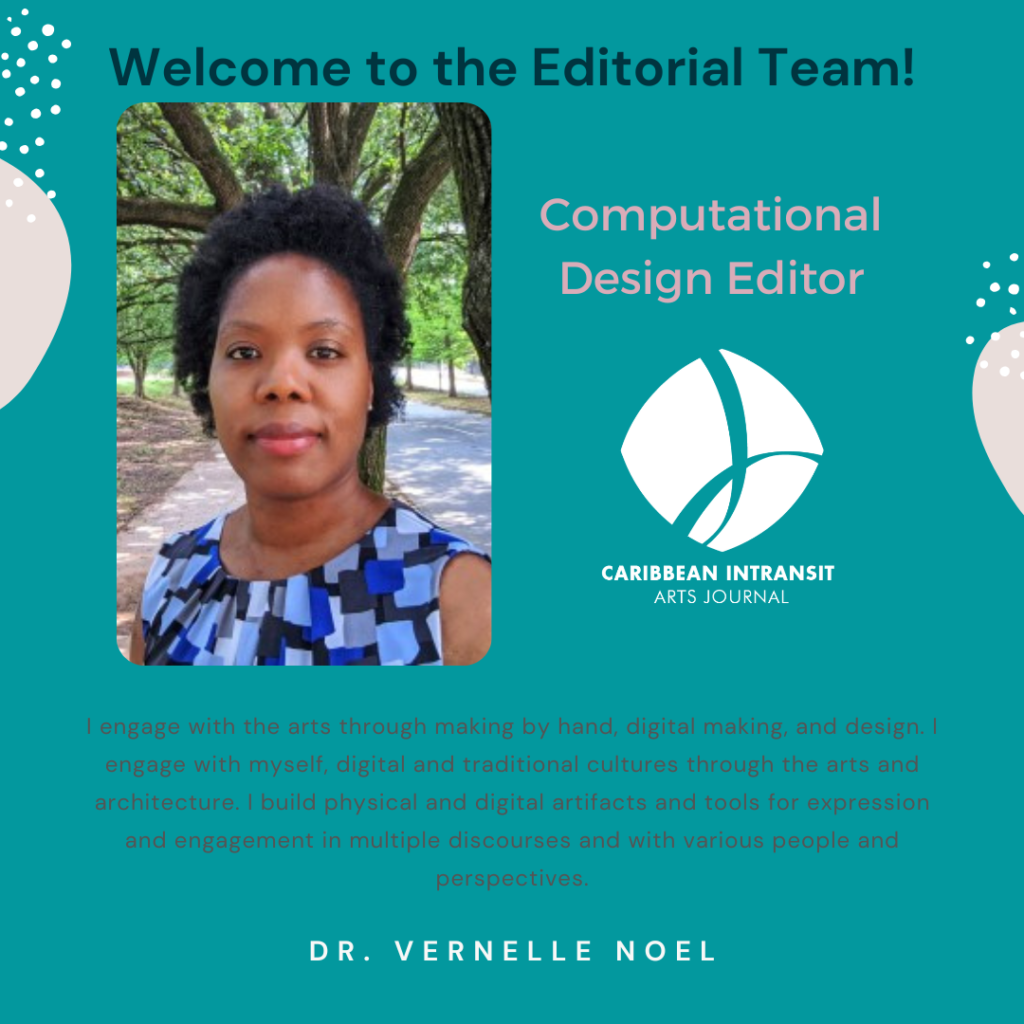Editorial Team
SPOTLIGHT ON OUR SPECIAL PROJECTS EDITOR
MARTA FERNANDEZ-CAMPA
Celebrating 10 years with Caribbean InTransit!


KEISHA
Keisha Oliver is Bahamian assistant professor of Art and Design at the
University of The Bahamas, and a Ph.D. candidate in the dual-title Art
Education and African American and Diaspora Studies program at the
Pennsylvania State University. As an artist-scholar whose research
intersects heritage studies and arts pedagogy, Oliver’s current work
focuses on African diasporic art histories and archives. She currently
stewards the Charles Blockson Collection of African Americana and
The African Diaspora at Penn State and serves on several boards and
councils for arts organizations in the Caribbean and United States. Her
research has been published internationally in the areas of museum
studies, visual arts research, Bahamian art, and Caribbean art history.
She is also an arts writer and independent curator .
EXECUTIVE BOARD MEMBER OF THE CARIBBEAN STUDIES ASSOCIATION
MEAGAN
Meagan A. Sylvester is a Caribbean scholar whose doctoral research
focused on Narratives of Resistance in Calypso and Ragga Socamusic.
Her continuing interrogation within the academy centers on Music,
Gender, and National Identity in Calypso and Soca, Music of Diasporic
Carnivals, Narratives of Resistance in Calypso and RaggaSoca music,
Steelpan and kaisoJazz musical identities. Teaching and research
interests are Caribbean Music Cultures and African Diaspora Popular
Culture. She holds memberships in professional organizations which
include the Society for Ethnomusicology, the International Association
of the Study for Popular Music, Caribbean Studies Association and the
Association of Black Sociologists.

E D I T O R - I N - C H I E F
Dr.Marielle Barrow
S P E C I A L P R O J E C T S E D I T O R
Dr. Marta Fernandez- Campa
F I C T I O N S E D I T O R
Dr. Njelle Hamilton
V I S U A L C O M M U N I C A T I O N S S P E C I A L I S T
Ms. Keisha Oliver
A N I M A T I O N E D I T O R
Ms. Camille Selvon- Abrahams
A R T S , E N T R E P R E N E U R S H I P & I M P A C T E D I T O R
Dr. Sacha Joseph- Mathews
C O M P U T A T I O N A L D E S I G N E D I T O R
Dr. Vernelle A. Noel
F R A N C O P H O N E E D I T O R
Dr. Maica Gugolati
Our Team

EDITOR-IN-CHIEF
D R . MA R IEL LE B A R R OW MA I G N A N

SPECIAL PROJECTS EDITOR
D R . MA R T A FE R N A N D EZ- C AMP

CO- GUEST EDITOR
M E A G A N S Y L V E S T E R

CO- GUEST EDITOR
K E I S H A O L I V E R
What does Urban Transit mean for a Caribbean creative landscape constantly in motion—not just through the physical geography of cities, but through the inner geographies of identity, memory, and aspiration? Urban Transit is more than the movement of bodies or ideas through space—it is the negotiation of identity, power, and possibility.
“Urban Transit,” seeks to critically interrogate the shifting dynamics of
body, institution, and memory within an emerging hybridity of cultural
production grounding them in broader cultural and sustainable
development goals. While noting the particular moment in which we find
ourselves- a seeming post-crisis moment of the fiction of COVID, we
recognise that post-pandemic is perhaps much in keeping with neocolonial realities that return us to questions of residues and fractious
conditions. While disconcerting, we anchor ourselves through our long
held visions of assembling a global Caribbean married to a parallel notion
of “global Africa” toward cultural confidence and economic
empowerment of our region.
In Homi K Bhabha’s 1994 text Location of Culture he speaks of
“Gatherings in the ghettos or cafés of city centres; gathering at the
frontiers; gatherings in the half-life, half-light of foreign cultures; gathering
the signs of approval and acceptance, degrees, discourses, disciplines;
gathering the memories of underdevelopment, of other worlds lived
retroactively; gathering the past in a ritual of revival; gathering the
present.” His poetic notions underscore the diverse spaces where cultural
negotiation have traditionally occurred and reflect the complexity of
identities formed in these intersections. He captures the dynamic and
transformative processes involved in the creation of meaning and
community in contexts of displacement, hybridity, and postcolonial
experience
In the Black American context, *Urban Transit* similarly navigates a
landscape of movement shaped by histories of displacement, migration,
and resistance. From the Great Migration to the present, Black
communities have continuously redefined urban space, carving out
networks of culture, activism, and entrepreneurship amid systemic
exclusion. The city—whether Harlem, Chicago, or Atlanta—becomes both
a site of possibility and contestation, where Black creativity emerges in
the interstices of gentrification, racialized policing, and economic
disparity. In this sense, the idea of “gathering” extends beyond physical
space into an ongoing negotiation of belonging, memory, and futurity—
mirroring the Caribbean’s own reckoning with colonial residues and postcrisis realities. Through this lens, we see *Urban Transit* as a diasporic
practice, forging new solidarities between a global Black consciousness
and the evolving geographies of culture and power.


In what ways does or should the itinerant nature of Caribbean artists influence the development of systemic infrastructure necessary for a sustainable creative economy in the region?
Additional sub-themes and queries aim to stimulate a diverserange of submissions while connecting theoretical
discussions to actionable frameworks.
- Our starting point at the moment for thinking about this anniversary edition hearkens to earlier work while propelling us forward, rooted and routed via various kinds of communities and networks which develop the broader body politic; who through their artistic practices build agency; tap into global politics; and simultaneously contend with dissonance within their worlds.
- Our curatorial process for this issue as in past issues is in some ways experimental. In an effort to include a larger number of curatorial voices, perspectives and even practices, we are inviting curators in the Caribbean to put forward recommendations of works which extend and complicate our discourse.
- We are committed to enablement and development of the Caribbean arts through dialogue and exhibition in varying creative forms and so during production, we will continually think and plan for how our work can sit alongside developmental processes already occurring within these communities and further enable such efforts.
- We recognize that artistic elites operate in every community to the exclusion of other practitioners and so we open a section of the exhibition to independent artists who operate differently in relation to recognized artistic communities and who feel that their works and their process have a meaningful, critical perspective to contribute to our discussion.
- Caribbean InTransit’s efforts in supporting and stimulating connections between communities and institutions has produced a network of productions and exhibitions that circulate the theme of “Body, Institution, Memory”. This widens and deepens our reach and the inclusion of multiple voices in approaching this theme with a developmental agenda. The critical perspectives produced by these symposia, discussions, essays and publications will contribute to the development of this anniversary edition. In this regard, we invite Caribbean InTransit team members and contributors who practice in the arts or write about it to submit their own considerations. We aim to include these submissions in some aspect of our final output
- We would like to invite other Caribbean focused journals, magazines or platforms to contribute to this anniversary edition in the form of an essay or other production which extends or responds critically to this conversation in collectively thinking about how we would like to develop the Caribbean arts community going forward.
THEMATIC CONSIDERATIONS
- "Resonance and Reflection: Music, Memory, and the Museum in Caribbean Creative Futures"
- "Cultural Currents: Music, Museums, and the Hybridity of Urban Transit"
- "Soundscapes and Memoryscapes: Bridging Past and Future in the Caribbean"
- "Museums of Sound, Archives of Memory: Hybrid Cultural Ecosystems"
- "Echoes of the Caribbean: Music, Museums, and the Transit of Identity
- Soundscapes of Resistance and Resilience
- Museums as Living Archives
- From Festival to Archive: Urban Transit in Practice
- How does the mobility of festivals—Carnival, Carifesta, or Diaspora-themed arts events—act as living archives that link tradition and contemporary practice?
- AI as Curator:
- Smart Festivals: Technology and Urban Transit
- AI in Memory and Storytelling
- AI’s role in creating interactive oral histories and memory archives.
- AI Ethics and Cultural Sovereignty
- Digital Equity and Inclusion in Caribbean Creative Industries
- How can AI democratize access to cultural and creative resources for underrepresented Caribbean communities?
- What constitutes a hybrid cultural ecosystem, and how can it address the unique challenges of the Caribbean creative industry
SUBMIT YOUR ABSTRACT FOR CONSIDERATION BY FEBRUARY 15TH
SUBMISSIONS
- Name
- Professional affiliation
- Contact information
- Title of Attached manuscript
- Keywords, at least 3 (essays only)
- An abstract of not more than 150 words (essays & interviews only) *a biography of not more than 60 words
- A professional photograph of yourself (optional)










